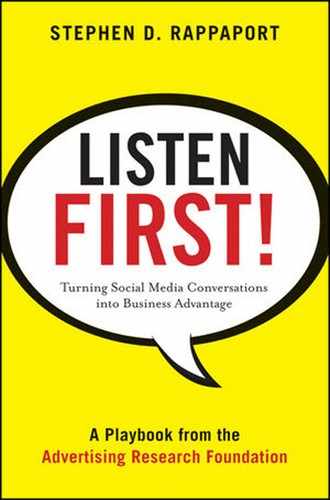Part IV
Listening's New Frontiers
Up until now, lessons from contemporary research and cases provided guidance based on the best of what is known about social media listening. As a young and still emerging field, listening is evolving and pushing boundaries. To understand what lies ahead, we consulted the Lewis and Clarks, experts actively exploring and mapping listening's new frontiers. This part's five chapters bring together 15 contributions from 18 leaders who grapple each day with listening and its business value for companies, their brands, and their products and services.
Rooted in their real-world experiences and presented from their perspectives, the essays of these leaders are remarkable, for their focus on issues central to business building, their specificity, and the strength of their prescriptions. There is, however, one overarching theme and directive that connects them all: Expand your thinking about listening and the ways you can apply it. Future contributions rest upon listening to new signals; diving into deeper levels of analysis and insight; basing decisions on listening data; and reinventing media and marketing as social processes centered on engagement. Companies need to become listening organizations through and through, if they are to achieve listening's goal: to sense, respond, and act in a timely customer-centered manner that mutually benefits their business and the people they serve.
Five winning plays were derived from these essays and each is covered in turn in Chapters 19 to 23. Here are the plays, with very high-level summaries. The chapters will provide a more detailed discussion of key themes.
- Listen to new signals. Not all listening signals come from conversation; some can be found in the silent signals of emotions. Listen openly, without preconceived notions and without prejudice in order to hear what people are really saying or expressing.
- Focus on culture. Deeper insight comes from understanding people in all of their cultural contexts. Listening is more than recognizing what people say; it includes understanding the values, motivations, meanings, and relationships that help explain why people speak and act as they do.
- Change the research paradigm. Social media listening research should bring about an era of real-time data that anticipates change and can be used to visualize and create a rewarding business future. For that to happen, data quality needs to improve; companies need to ensure that their people develop and work with quality data; and organizations need to effectively communicate the insights from this data throughout their enterprises.
- Rethink marketing, advertising, and media. Conversations are being considered like media. This change challenges conventional notions of what advertising is, how it is planned and bought, how it is consumed, and how it is evaluated. One controversial scenario outlined describes an emerging world where advertisers pay people for conversations that ripple through social networks, instead of paying media companies for ad placements as often as they used to. Conversations, engagement, and mobility are creating a globe-circling “people's network,” with new rules for effective and successful marketing.
- Become a listening organization. Productive listening requires that you have the right organizational structure and executive support—something many companies often lack. We need to view and implement social media listening strategically, with an eye toward improving business processes and driving company culture. Organizations must embrace a new “mental model” for listening, one that is capable of sustainably creating value for the enterprise.
Now, onward to the future of listening.
